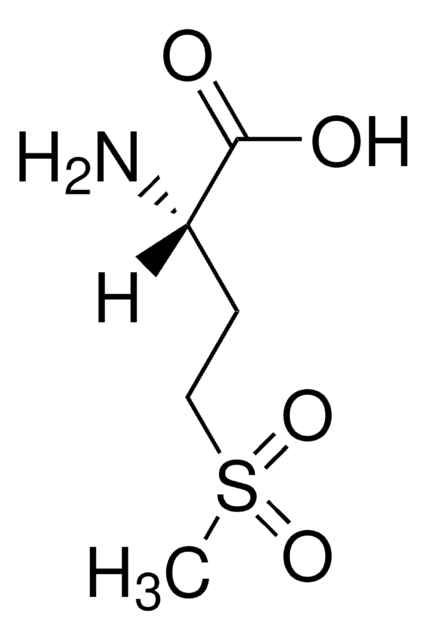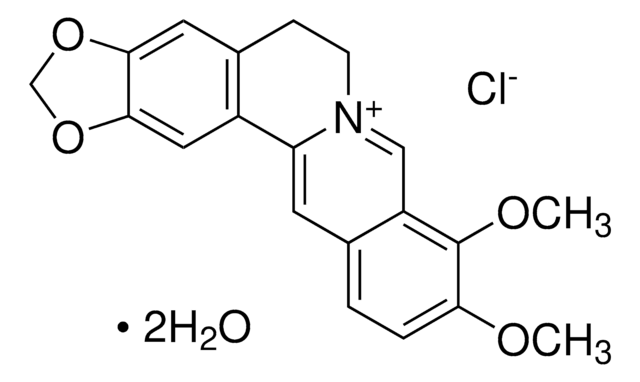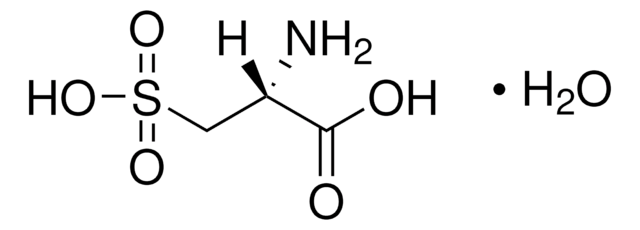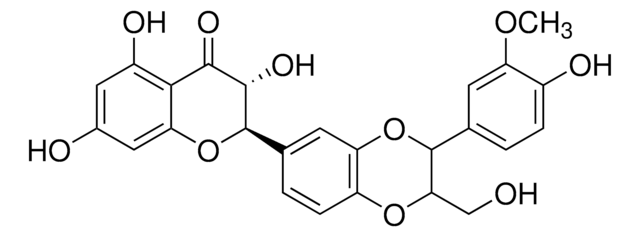PHL80429
Dihydroberberine
phyproof® Reference Substance
Sinónimos:
5,8-Dihydro-9,10-dimethoxy-6H-benzo[g]-1,3-benzodioxolo[5,6-a]quinolizine, Dihydroumbellatine
About This Item
Productos recomendados
grado
primary reference standard
Línea del producto
phyproof® Reference Substance
Ensayo
≥90.0% (HPLC)
fabricante / nombre comercial
PhytoLab
Formato
neat
InChI
1S/C20H19NO4/c1-22-17-4-3-12-7-16-14-9-19-18(24-11-25-19)8-13(14)5-6-21(16)10-15(12)20(17)23-2/h3-4,7-9H,5-6,10-11H2,1-2H3
Clave InChI
FZAGOOYMTPGPGF-UHFFFAOYSA-N
Categorías relacionadas
Descripción general
Aplicación
- (+)-Abscisic acid in plant stress hormone research: Investigated the cloning of CAT genes in Satsuma mandarin and their expression characteristics in response to environmental stress and arbuscular mycorrhizal fungi. This research highlights the crucial role of (+)-abscisic acid in mediating plant responses to abiotic stresses, demonstrating its utility as a high-purity biochemical assay reagent for studying stress response signaling in plants (Liu et al., 2024).
- (+)-Abscisic acid in biochemical assays: The physiological and biochemical response of Styrax tonkinensis seedlings to waterlogging stress was analyzed. This research underscores the importance of (+)-abscisic acid in biochemical assays aimed at understanding how plants cope with water stress, reinforcing its role in signal transduction studies related to plant survival mechanisms under adverse conditions (Chen et al., 2024).
- Synthetic (+)-abscisic acid in plant biology: Examined RNA splicing and its effects on the postharvest physiological deterioration of cassava storage roots. The study discusses the involvement of (+)-abscisic acid in plant biology, particularly in how it influences postharvest changes through its role in signaling pathways that control physiological processes in plants (Gu et al., 2024).
Información legal
Palabra de señalización
Danger
Frases de peligro
Consejos de prudencia
Clasificaciones de peligro
Acute Tox. 2 Oral
Código de clase de almacenamiento
6.1A - Combustible, acute toxic Cat. 1 and 2 / very toxic hazardous materials
Clase de riesgo para el agua (WGK)
WGK 3
Punto de inflamabilidad (°F)
Not applicable
Punto de inflamabilidad (°C)
Not applicable
Elija entre una de las versiones más recientes:
¿Ya tiene este producto?
Encuentre la documentación para los productos que ha comprado recientemente en la Biblioteca de documentos.
Nuestro equipo de científicos tiene experiencia en todas las áreas de investigación: Ciencias de la vida, Ciencia de los materiales, Síntesis química, Cromatografía, Analítica y muchas otras.
Póngase en contacto con el Servicio técnico







